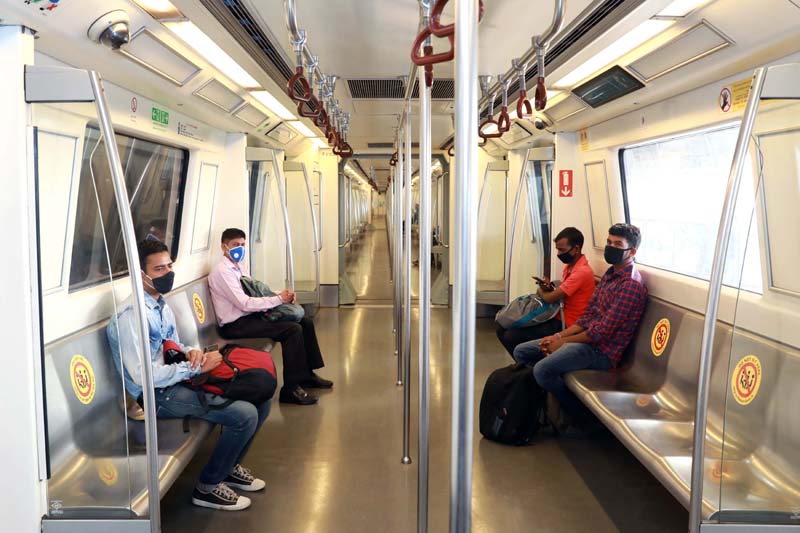
NEW DELHI, Sept 7:
The Delhi Metro resumed services with curtailed operations on the Yellow Line on Monday after being closed for over five months due to the COVID-19 pandemic, as both the DMRC and the commuters trod with caution amid the new normal in the rapid transport system.
Trains will operate in batches of four-hour each from 7-11 am in the morning and 4-8 pm in the evening, officials said.
The operations in the first four hours from 7-11 am were smooth and around 7,500 passengers availed the services, the DMRC said in a statement.
All possible measures will be taken to ensure that services are smooth in the evening (from 4-8pm) as well, it added.
The metro services resumed with strict safety and social distancing measures in place. The first trains left from Samaypur Badli station to HUDA City Centre station and simultaneously from HUDA City Centre to Samaypur Badli at 7 am, a senior official of DMRC said.
“We are on our way. It’s been 169 days since we’ve seen you! Travel responsibly and commute if it’s only necessary. #MetroBackOnTrack,” the DMRC tweeted in the morning and posted a video clip of the first train leaving HUDA City Centre
No stations on the Yellow Line were closed as none is in proximity to any containment zone, the official said.
As the day began, some riders wearing protective masks were seen entering the premises of key stations like Kashmere Gate and Hauz Khas on the Yellow Line, which connects Samyapur Badli in Delhi to HUDA City Centre in Gurgaon.
“A few happy faces from our first journey after more than 5 months. #MetroBackOnTrack,” the DMRC said in another tweet and posted pictures of some commuters wearing masks inside train coaches.
On the station premises, passengers were permitted to enter the concourse only after temperature checks with thermal guns and sanitisation of hands.
Hundreds of Delhi Metro ground staff and Central Industrial Security Force personnel wore face shields, masks and gloves as preventive measures against the pathogen.
The Home Ministry had recently issued guidelines allowing metro services in the country to resume operations in a graded manner, following which the Delhi Metro Rail Corporation (DMRC) had said it would be done in three stages from September 7-12.
Under stage one, Yellow Line or Line 2 and Rapid Metro were made operational with restricted service hours, a DMRC official said.
Metro services in the National Capital Region were closed since March 22 due to the pandemic.
The DMRC has appealed to people to use the rapid transport only if urgently needed.
Wearing of masks inside train coaches and station premises is mandatory, and those found violating the guidelines would be fined by authorities.
The metro services resumed a day after Delhi registered 3,256 new coronavirus cases, the highest single-day spike in 72 days, taking the tally to over 1.91 lakh.
Commuters are returning to the Delhi Metro stations and coaches after a huge gap of 169 days, with COVID-19 completely changing the paradigm of operations.
Use of Aarogya Setu App by commuters is advisable, the DMRC has said.
In keeping with the new normal, the Delhi Metro has taken a slew of measures to ensure least physical contact for riders, like automated thermal screening-cum-sanitiser dispenser and lift-calling system driven by a foot pedal at several stations.
Inside coaches, commuters are to sit on alternate seats and maintain prescribed distance even while standing. Stickers have been put up on alternate seats and on platforms so that riders adhere to social-distancing norms.
Special posters have been put up inside coaches and on station premises to raise awareness, besides regular announcements on safety norms.
The DMRC had also appealed to commuters on Sunday to “talk less inside trains to prevent the possibility of short-range aerosol transmission”.
Officials of the urban transporter had earlier cautioned that “trains may not stop at some of the stations” if social-distancing norms were not adhered to by passengers.
“This is a new normal and an evolving scenario, so we will anyway be assessing the situation as we go along,” an official said. (PTI)

